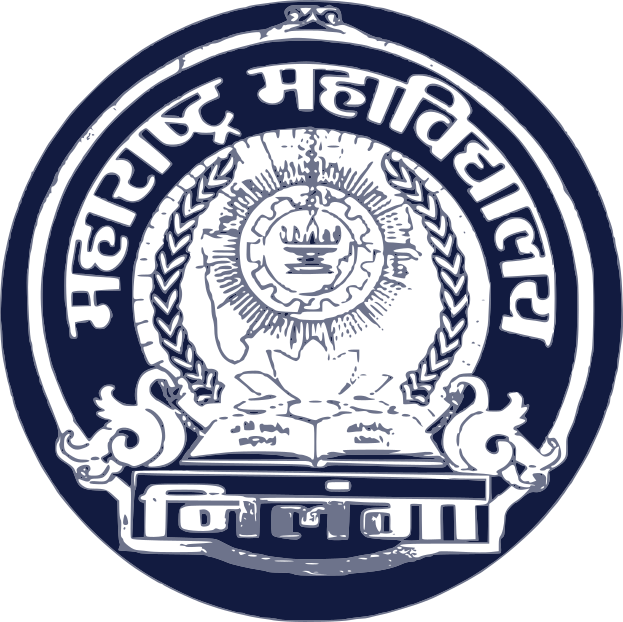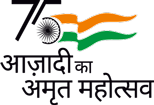Department of Public Administration
- About the Department:
The Department of Public Administration was established in the academic year 1970. At present, this Department offering B.A. degree course with one of the three subjects as Public Administration under UG program affiliated to Swami Ramanand Teerth Marathwada University, Nanded. Now the department has 01 regular faculty and 01 CHB faculties. The Department of Public Administration is one of the important departments of our college. Department has striven to set high standards of teaching.
Students who graduate from the Department have a wide variety of career options to choose from. These include academics, research, civil services, management, operations and entrepreneurship. Our cherished alumni, maintaining a continuous connection with us, have carved remarkable paths across diverse fields.
Our faculty members also conduct ongoing research on the best Public Relations in a variety of areas like, Local Self Government ,local Office Visit and Dynamics.
- Mission
Public Administration is one of the youngest branch of Faculty of Humanities. With the expansion of the activities of modern state, public administration has assumed great significance in modern society. The Public Administration and Administrative Officers playing impartment role in social and economic development of the Nation. Administration is as old as mankind. It has acquired all spheres of human life right from birth to death. It is very close to the daily life of any person in practical. Public Administration Studies the systematic implementation of Laws and Government policies, theories principles and its controlling system. The subject stands as an integral element of democratic system of the nation. It is intended that the subject is introduced, as a optional subject to the students of U.G. level. The subject is introduced to comprehend the importance of Administration theory and practice. as well as Public Administration and private Administration, Public Private Partnership, civil society and sustainable development .
- Vision
Public Administration is one of the youngest branches of Faculty of Humanities. With the expansion of the activities of modern state, public administration has assumed great significance in modern society. The impact of Information Technology has given to many new trends which have all branches in public administration. Recent trends is an important part of public administration.
The main thing is to impart knowledge of recent trends in public administration
- Faculty
| Sr. NO. | Name Of The Faculty | Designation | Date Of Joining | Experience | C.V. | |
| 1 | Dr. V.P.Sandur | Assistant Professor & Head | 12.07.2013 | 10 Years | CV | 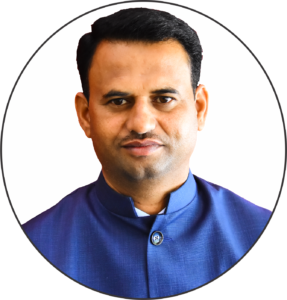 |
| 2 | Miss .Punam Satpute | Assistant Professor | 01.06.2023 | 01 Years | CV |  |
- Faculty Awards/Achievements /Recognition
| Sr. No. | Name of the Faculty | Year | Title of the Award/Achievement /Recognition |
| 1 | Nodal Officer | 2020-21 | Nilanga Tahashil Office, Nilanga |
- PROGRAMMES OFFERED
| Sr. No. | Name of the Programme | Duration | Programme Outcomes |
| 1. | B.A. | 03 yrs | To provide with the opportunity to acquire Public Administration reach it to at least Key Stage UG Level.
To enable us to start the postgraduate basic training of Public Administration as it is a requirement of the training of Basic Public Administration. To improve Students chances of employment. |
- Courses Offered
| Year | Semester | Titles of the Courses | Course Outcomes |
| B.A. I | I | Basic principles of public Administration. –1 | 1.The course introduces and provides knowledge or public administration
2. The provide knowledge of the new trains in public administration 3.To understand the relation of public administration with other humanities |
| 2. District Administration-2 | 1.To know. District administration
2.To understand structure and function off various administrative offices of district administration 3.To provide knowledge of the Revenue administration police administration and judiciary system at district and taluka level
|
||
| B.A. I | II | 3. Administrative Organizations and It’s Principles -3.
|
1) Basic Knowledge of administrative Organization and its principles.
2) To provide knowledge of the Functions and qualities of chief executive 3) To understand the importance of public relations in administration |
| 4. Administrative System of Maharashtra State
Paper No. –IV |
1) To Understand the Role of Chief Minister and State Secretariat in Maharashtra state.
2) To understand Structure and function of State Legislature 3) To provide knowledge of the state government and Administration. Course Content Periods |
||
| B.A II | III | 6. Rural Local Government – VI | 1. Develop a rural local leadership.
2. Awareness of the basic governing system as well as development measures. 3. It will provide knowledge of Three tier system of Panchayati Raj in Maharashtra state. 4. Understand the role of Panchyat Raj Institutes as the main instrument of State to achieve its Rural developmental goals |
| 7. Financial Administration -Vii | 1. Awareness of the basic financial system as well as development measures.
2. Explain the importance of Budget and Financial Administration. 3. Analyse the various issues related to Indian Budget. 4. Understand the role of Finance Administration as the main source of development |
||
| 8. Urban Local Government -VIII | 1. It help the students Conceptualize about the developmental process as nations develop cities grow, and how planning is done & implemented in a bottom – to- top approach.
2. Awareness of the basic governing system ( Urban) as well as development measures. 3. Exhibit the efforts for urban development in Maharashtra state. |
||
| B.A III | V | 9. Indian Administrative Thinkers-IX
(Effective from June 2021) |
The students will be channelized to learn and understand
various theories put forth by Indian administrative thinkers regarding public administration. Through the narratives described in the course students will be made acquainted with ancient theories advocated by administrative thinkers like Kautilya about good governance and his views about eradication of corruption. |
| 10 Office Administration-X | 1. The Content of the course will enable the students to prepare themselves for various competitive examinations such as U.P.S.C.,M.P.S.C. and other competitive examinations. The students will learn and try to understand the functioning of Indian Administrative System. Due to the course the students will be understand the role of administration in Nation development.
1. To understand the meaning of Office Administration. 2. To introduce the Office Procedure and Method. 3. To identify various problems in Office Administration. |
||
| 11. Western Administrative Thinkers-XI | 1) To provide basic Knowledge of administrative theories.
2) To Understand the western Administrative theory. 3) To Familiarize the students with basic Knowledge of Modern administrative thought |
||
| VI | 12. Indian Constitution & Administration-XII
OR |
1)To Understand the formation of Indian Constitution
2)To identify the Role of various Constitutional & Other National Bodies. 3)To introduce the fundamental Rights and Duties |
|
| 12. Recent Trends in Public Administration -XII | 1) To Understand the emerging and recent trends in public administration.
2) To Know the Importance of Information Technology in Public Administration. 3) To introduce and provide knowledge of Right . |
- Results
| Sr. No. | Academic Year | No. of Students Enrolled | No. of Students Appeared for Exam | Passed | Failed | Percentage of Result |
| 1. | 2019-20 | 10 | 10 | 10 | 00 | 100% |
| 2. | 2020-21 | 10 | 10 | 10 | 00 | 100% |
| 3. | 2021-22 | 22 | 22 | 22 | 00 | 100% |
| 4. | 2022-23 | 22 | 22 | 22 | 00 | 100% |
| 5. | 2023-24 | 17 | 17 | 17 | 00 | 100% |
- Students’ Achievements/ Merits
| Sr. No. | Academic Year | Name of the Student | Subject Merit |
| 1 | 2018-19 | 1. Jadhav Shital Balaje | I |
| 2. Mane Rohine Balaje | II | ||
| 3. Jadhav Supriya Datta | III | ||
| 2 | 2019-20 | 1. Inde Pramod Satish | I |
| 2. Dafedar Shabnam Khurumali | II | ||
| 3. Kumbhar Keshav Dnyanoba | III | ||
| 3 | 2020-21 | 1. Damawale Akash Shivaji | I |
| 2. Somwanshi Dipali Maruti | II | ||
| 3. Patil Sadhana Shahuraj | III | ||
| 4 | 2021-22 | 1. Mane Supriya Balaji | I |
| 2. Surywanshi Priya N. | II | ||
| 3. Mane Mayuri N. | III | ||
| 5 | 2022-23 | 1. Ku Panchal Sapna Dilep | I |
| 2. Apsingekar Vasundhara Bandu | II | ||
| 3. Jadhav Adinath Pandurang | III |
- Best Practices of the Department
| 1. Panchyat Samiti : Administrative Visit | |
 |
 |
| 2. Police Station Nilanga, Visit | |
 |
 |
| 3. Guest Lecturer : Dr. Santram Munde, M.C. Member, SRTMU, Nanded | |
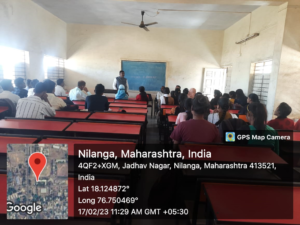 |
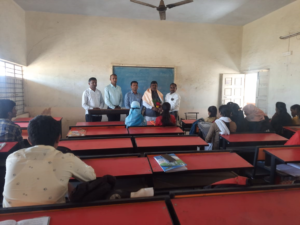 |
| 4. Guest Lecturer : Dr. Balaji katturwar , BOS Chairman, SRTMU, Nanded | |
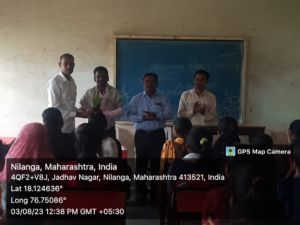 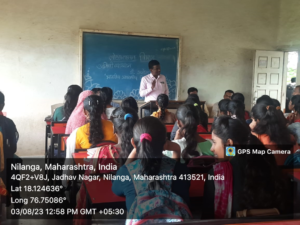 |
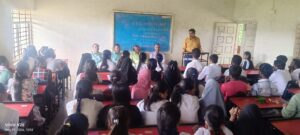 |
| 5. Guest Lecturer : Dr. Lonarkar Sir, Kamlatai Jamkar Mahavidyalaya, Parbhani | |
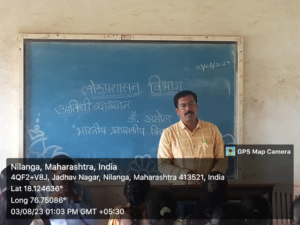 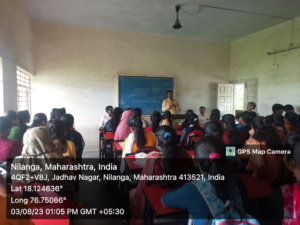 |
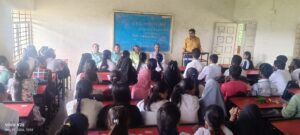 |
| 6. Guest Lecturer : Dr. Amol Kale, Peoples College, Nanded | |
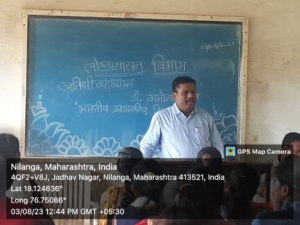 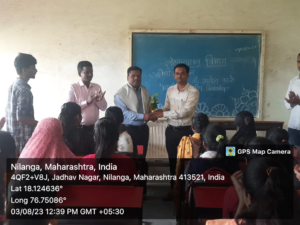 |
|
| 7. Handbook | |
| Hand OUT | |
| Voter Awareness Program | 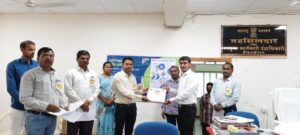 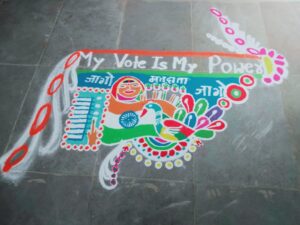 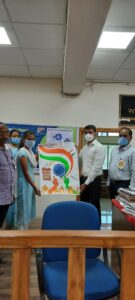 |
| Police Station Visit | 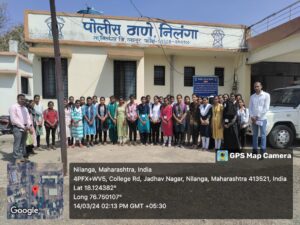 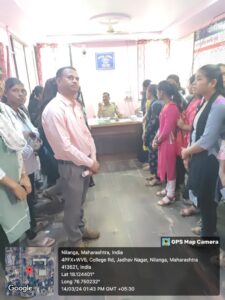 |
| Topper Student Prize | 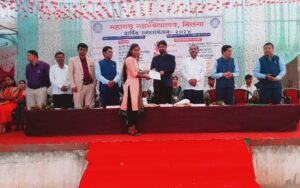 |
- Notable Alumni
| Sr. No. | Name of the Alumni | Education | Present Designation/Place |
| 1. | Pawar Radhika Vijaykumar | M.A. Pub. Admin | Dayanand Mahavidyalya, Latur |
| 2. | Arab Parveenbee Jaonoddin | M.A. History | Shri. Chh. Shivaji College, Omarga |
| 3. | Hadole Sonali Gopalrao | LLB. | Dayanand Law College, Latur |
| 4. | Panchal Sapana Dilip | BOS | SRTMU Nanded |
| 5. | Mane Pornima Ram | SET | M.M.Nilanga |
| 6 | Jadhav Shital Balaji | Proses Executive | Infosys Pune |
